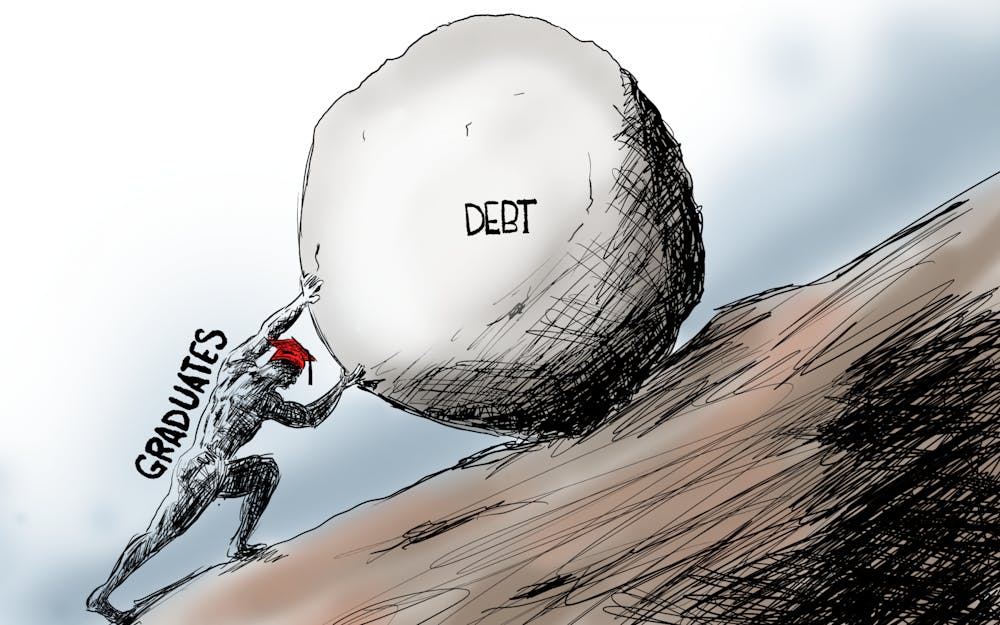On Tuesday, Feb. 28, the U.S. Supreme Court heard oral arguments in Biden v. Nebraska and Department of Education v. Brown. These two cases separately ask the court to strike down the student loan debt relief program President Joe Biden announced last August.
That program — which would forgive up to $10,000 in student loan debt for non-Pell Grant recipients and up to $20,000 for those who have received Pell Grants — would eliminate student loan debt entirely for about 20 million people.
Even so, it’s likely our conservative Supreme Court will block it from taking effect.
I’d love to say this is surprising, but if you know anything about the court then you know, like I do, this was bound to happen from the start.
[Related: OPINION: Thank you Mr. President, but you should cancel it all]
It’s worth sidetracking a bit here to make note of the fact I don’t believe Biden’s original plan went far enough. Any student loan relief is good, true; but, in a just world, nobody would have to take out a loan so they could pay for school. The ideal course of action then, is for Biden to simply eliminate all student debt entirely.
Bonus points if Congress were to pass an act eliminating tuition at all public universities. And even more if the Department of Education provided low-income students with Pell Grants to cover all non-tuition costs, thus rendering student debt obsolete. But, that’s another opinion for another column.
Where was I? Right, the likelihood the Supreme Court, whose youngest member is 51 years old, will tell all college graduates to buzz off and forget about anything even resembling student debt relief. Let the idea wither from your mind, because there’s not a chance in hell the six Republican-appointed justices, who all attended private universities, will ever let us poor public-school filth have any sort of advantage in life.
If I am correct, it will hardly be the worst decision the court has made in recent years. I’m not sure anything could top it contradicting itself and concluding, nearly 50 years after the fact, that people no longer have the right to an abortion. But, more than anything, this trend of horrible decisions is an indictment of the court’s unchecked power.
Why should nine unelected officials be allowed to decide the quality-of-life of millions of people? Are these nine individuals really so infinitely wise as to determine whether the rest of the country deserves certain civil rights or financial assistance?
The arguments of the two cases are very different, but they ultimately come down to whether the student loan relief program is unconstitutional. There’s debate over whether the cases have legal standing, but ultimately this doesn’t have to matter to the Supreme Court. As long as four justices agree to hear the case, and five agree on the decision, they can do it — there’s no other governmental body telling them they can’t.
[Related: OPINION: Undoing progress is an American tradition]
Let’s run through what the executive or legislative branch can, theoretically, do to check the Supreme Court’s power: the obvious one is that it’s the president who nominates court candidates and the Senate that confirms them; the less-than-obvious one is that Congress can impeach justices much the same way they can the president.
Right now, the first one is null — the only way Biden and the Senate are going to nominate and confirm a new justice is if one suddenly retires or dies, which is unlikely to happen soon. The second one may as well also be null, considering only one justice has ever been impeached, and he was never convicted by the Senate.
So, beyond things like expanding the court, which would be a major congressional battle unlikely to even come close to succeeding, there’s little room for the separation of powers to check or balance the Supreme Court.
Anything is possible, but it seems likely our student loans will remain how they are.
This is a roadblock, yes, but it doesn’t need to be the end of the trip. By reminding the government it is us it works for, and not the other way around, we were able to even bring the idea of loan forgiveness into the mainstream conversation and rally a sitting president onto our side.
Progressive action made this possible, and I’m certain it can and will make much more possible.
Joey Sills (he/him) is a sophomore studying journalism and political science.




